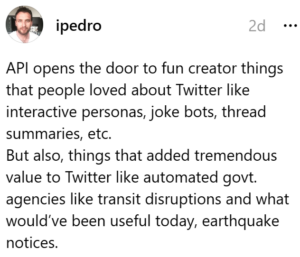Threads, the new social network from Meta, is working on an API for developers, according to Instagram chief Adam Mosseri. This means that soon we might see third-party apps and services that can integrate with Threads and offer different ways of using the platform.
Adam Mosseri shared the information in response to a user who was talking about the potential for Threads to have an experience similar to TweetDeck. Concerning the debut of the API, he also mentioned that it might result in fewer creator content on Threads and more publisher content.

But what does this mean for the future of social media? Will Threads become more diverse and innovative, or more cluttered and noisy? Will it attract more users and creators, or more publishers and advertisers? Also, will it challenge X (formerly Twitter), or coexist with it?
Threads API for developers is in the works
An API, or application programming interface, is a set of tools and protocols that allows developers to create applications and services that can interact with other platforms. For instance, developers might be able to construct Threads clients with different features and functionality than the official app.
Alternatively, it might make it possible for developers to produce widgets, extensions, and bots that improve Threads’ user experience. Additionally, it could make it possible for developers to link Threads to other websites and applications.

On one hand, I think an API could be a great opportunity for Threads to grow and evolve. On the other hand, I also have some reservations about the API. I wonder if it will compromise the simplicity and user-friendliness of Threads, which is one of its main selling points. Therefore, I put together a list of pros and cons that we’ll possibly experience once this capability is widely available.
Potential benefits of an API on Threads
The potential benefits of launching an API are manifold. You can check them out below:
Innovation and creativity
One of the benefits of launching an API is that it could foster innovation and creativity on Threads, by allowing developers to experiment with new ideas and solutions that cater to different needs and preferences of users. For example, developers could create clients for Threads that offer different features and functionalities than the official app, such as custom themes, filters, layouts, or modes.
Also, by enabling developers to create such apps and services, Threads could offer more options and choices for users to personalize their experience on the platform. It could also offer more opportunities for users to express themselves and showcase their talents and skills on the platform.
Reach and engagement
Another benefit of launching an API is that it could increase the reach and engagement of Threads, by allowing it to connect with other platforms and audiences that may not be using Threads yet. For example, developers could allow users to cross-post their threads to other social networks, such as Instagram or Facebook. Developers could also create services that allow users to import or export their threads from or to other platforms such as blogs, podcasts or e-books.
Quality and diversity
Last but not least, launching an API could improve the quality and diversity of content on Threads. It can be achieved by allowing users to access more information and entertainment from various sources and formats. For example, some apps and services can allow users to embed or attach media content from other platforms to their threads.
The quality of Threads can also be enhanced by giving access to users on more information in a wider range of sources. Moreover, it could elevate the discovery and exploration of content on Threads too.
Possible risks and challenges of launching an API on Threads
Introducing an API on Threads also involves some risks and challenges. It ranges from privacy concerns and the specter of misinformation to the looming threat of spam. To know more, you can check out the drawbacks below:
Security and reliability
One of the risks of integrating an API into Thread is that it requires a lot of resources and maintenance to ensure that it is secure and reliable. API could expose Threads to various threats and vulnerabilities, such as hacking or phishing. For example, hackers could exploit the API to access or manipulate user data, accounts, or threads without their consent.
To prevent such scenarios, Threads would have to invest a lot of time and money into developing and maintaining a secure API that can withstand such attacks.
Simplicity and user-friendliness
Launching an API carries additional risk and difficulty since it may jeopardize Threads simplicity and user-friendliness. Threads users may encounter a greater number of options that are not always clear or simple to navigate, which could add to the platform’s complexity and confusion. For instance, in order to access the third-party applications that interface with Threads, users might need to go through several menus, settings, or permission requirements.
Can affect the Nature of the platform
Threads was created for users to share their thoughts, opinions, and feelings with the world in short posts called threads. However, by launching an API, Threads could introduce more conflicts and tensions between different stakeholders on Threads, such as users, creators, publishers, advertisers, developers, and Meta.
For example, users may feel annoyed by the influx of publisher content that may flood the platform. Or creators may feel overshadowed by the dominance of publisher content or ads. To mitigate such scenarios, Threads would have to ensure that its API is aligned with its mission and values of empowering creators and fostering authentic conversations.
Conclusion
So, these are some of the trade-offs that Threads will have to face when launching its API. How it will balance them will depend on its vision and strategy for its API. It also relies on how Threads handles the policy and guidelines for developers who are willing to utilize its API. As well as how it evaluates and authorizes the apps and services that are submitted.
Ultimately, the success or failure of Threads API will depend on how it will affect the user experience on the platform. Will it make Threads more enjoyable and useful for users? Or will it make Threads more attractive and rewarding for creators? These are some of the questions that will determine whether Threads’ API will be a game-changer or a gamble for social media.
PiunikaWeb started as purely an investigative tech journalism website with main focus on ‘breaking’ or ‘exclusive’ news. In no time, our stories got picked up by the likes of Forbes, Foxnews, Gizmodo, TechCrunch, Engadget, The Verge, Macrumors, and many others. Want to know more about us? Head here.



